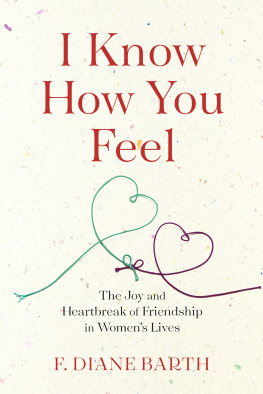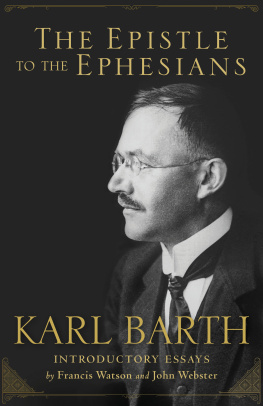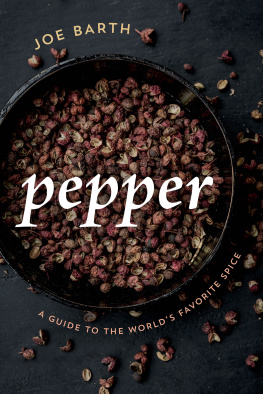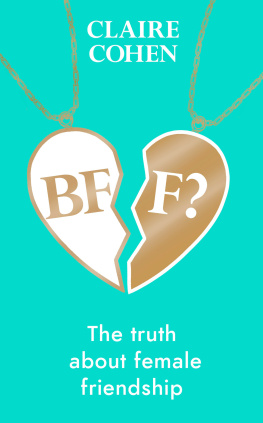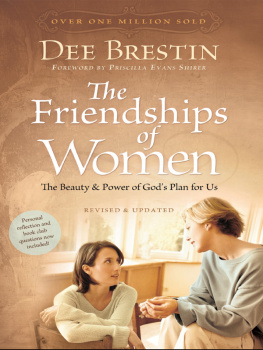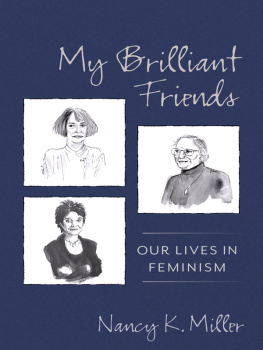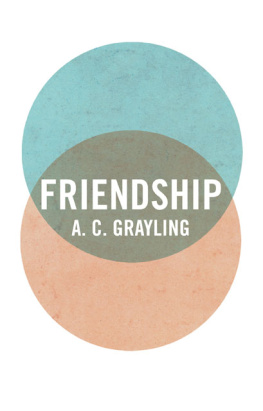Barth - I know how you feel: the joy and heartbreak of friendship in womens lives
Here you can read online Barth - I know how you feel: the joy and heartbreak of friendship in womens lives full text of the book (entire story) in english for free. Download pdf and epub, get meaning, cover and reviews about this ebook. City: Boston, year: 2018, publisher: Houghton Mifflin Harcourt, genre: Home and family. Description of the work, (preface) as well as reviews are available. Best literature library LitArk.com created for fans of good reading and offers a wide selection of genres:
Romance novel
Science fiction
Adventure
Detective
Science
History
Home and family
Prose
Art
Politics
Computer
Non-fiction
Religion
Business
Children
Humor
Choose a favorite category and find really read worthwhile books. Enjoy immersion in the world of imagination, feel the emotions of the characters or learn something new for yourself, make an fascinating discovery.
- Book:I know how you feel: the joy and heartbreak of friendship in womens lives
- Author:
- Publisher:Houghton Mifflin Harcourt
- Genre:
- Year:2018
- City:Boston
- Rating:4 / 5
- Favourites:Add to favourites
- Your mark:
- 80
- 1
- 2
- 3
- 4
- 5
I know how you feel: the joy and heartbreak of friendship in womens lives: summary, description and annotation
We offer to read an annotation, description, summary or preface (depends on what the author of the book "I know how you feel: the joy and heartbreak of friendship in womens lives" wrote himself). If you haven't found the necessary information about the book — write in the comments, we will try to find it.
An experts rich exploration of the intense, complicated landscape of womens friendships
Barth: author's other books
Who wrote I know how you feel: the joy and heartbreak of friendship in womens lives? Find out the surname, the name of the author of the book and a list of all author's works by series.
I know how you feel: the joy and heartbreak of friendship in womens lives — read online for free the complete book (whole text) full work
Below is the text of the book, divided by pages. System saving the place of the last page read, allows you to conveniently read the book "I know how you feel: the joy and heartbreak of friendship in womens lives" online for free, without having to search again every time where you left off. Put a bookmark, and you can go to the page where you finished reading at any time.
Font size:
Interval:
Bookmark:
Copyright 2018 by F. Diane Barth
All rights reserved
For information about permission to reproduce selections from this book, write to or to Permissions, Houghton Mifflin Harcourt Publishing Company, 3 Park Avenue, 19th Floor, New York, New York 10016.
hmhco.com
Library of Congress Cataloging-in-Publication Data is available.
ISBN 978-0-544-87027-7
The definitions of betray,boundary, and empathy are copyright 2016 by Houghton Mifflin Harcourt Publishing Company. Adapted and reproduced by permission from The American Heritage Dictionary of the English Language, Fifth Edition.
Cover design by Kimberly Glyder
Cover photograph Yuji Saka/Getty Images
Author photograph Tricia McCormack
e ISBN 978-0-544-87029-1
v1.0118
To Simon and Blair, with love, as you begin your new life together
When my son was going through the terrible twos, he had a major temper tantrum on the sidewalk outside our apartment building. Unable to calm him, and knowing that the eyes of a number of my neighbors were on us, I became increasingly flustered. The buildings doorman, whom my son adored, stepped in; kneeling down to my son at eye level, he quietly soothed him. After thanking the doorman profusely, I hurried upstairs with my now happy child.
Once in the apartment, I had no idea what to do next. Could a two-year-old understand that he had behaved badly? He was busily playing with his toys, but I was still rattled. I knew I needed to compose myself before I could figure out my next step. So I did what women have been doing since the telephone was invented. I called a friend.
When I had poured out the whole sad story, she chuckled quietly and said, Poor you. I know just how you feel. Its so embarrassing not to be able to deal with your own kid. And then she told me about her own childrens tantrums and some of the ways she hadand had notdealt with them. By the time we had talked for ten minutes, I was calm and had decided to try to explain, in language a two-year-old could grasp, why his behavior was not okay. Whether he understood anything I said in that conversation, I have no idea. But the incident has stayed with me, because it captures what women friends have been doing for one another throughout history: soothing, empathizing, advising, and understanding.
These are some of the wonderful benefits of our friendships with other women. We celebrate and mourn, talk and listen, and provide sustenance, companionship, and hope to one other. Women laugh and cry together, enhancing our good feelings and easing our bad ones.
But friendships between women do not always work so smoothly. I have been paying attention to, talking about, and working as a psychotherapist on womens friendships for years. In life and in my work I have seen many examples of these special relationships gone wrong. Hurt, anger, guilt, and sorrow are also part of womens friendships. And despite the widely held belief that women have deeply meaningful connections to one another, plenty of women simply do not find other women particularly supportive or interesting, and never have understood what all of the friendship fuss, as one of my clients puts it, is about. Women are supposed to be good at friendships. At least thats what we hear and see all the timenot only in the media, but in serious psychological literature as well. But the truth, as Luise Eichenbaum and Susie Orbach write in their book Between Women, is that we have put womens friendships on a pedestal, idealizing some aspects of these relationships while ignoring others. When it comes to close bonds with other women, many of us feel insecure and anxious.
I hear about these anxieties daily. For instance, one woman told me, I just found out that my friend is getting promoted. I should be happy for her, but Im not. Whats the matter with me? What kind of friend am I?
Another, working on a toast for a friends wedding, said, Im so worried that Im not going to say the right things. We have a complicated relationship. I mean, I love her to death, but weve had our moments too. I want to say some funny things, but I dont want any of it to sound mean. Oh, why did I ever let her talk me into doing this?
A young mother told me that she had been neglecting her friends since the birth of her second child. I miss them. They probably hate me by now. I never have time to talk. I dont know what any of them are doing.
A recent divorce asked, What is it with my friends? Do they think I dont need them anymore now that Im on my own? Where did they all go?
What do we do when a friend deserts or betrays us? What happens when a close friend is doing something we dont like or dont approve of? Does a good friend keep her mouth closed or give unwanted advice? What is a good friend, anyway?
In my search for answers, I interviewed many women, from all over the world, and with a wide range of backgrounds, personalities, and lifestyles. Some of them were gifted at friendship, others had always felt awkward about these relationships, and some told me that they had become more skilled and comfortable as they got older. Many had never given the subject of womens friendships much thought, although as soon as I brought it up, they said, Oh, thats so important! Others often worried about many of the same things that concerned my clients. But whether they questioned their own friendship abilitiesand even their self-worthas well as the depth and quality of their bonds, few had ever spoken about these matters to anyone else, often struggling silently with the complex and sometimes painful sides of these all-important relationships, and wondering what they could do to make things better next time.
In writing I Know How You Feel, I wanted to find out what women thought about questions like these: Why do we feel so unprotected when it comes to women friends? Does the discomfort go away with age and experience? Or does it intensify? Why does a contact from the past fill us with such powerful and confusing feelings? And, of course, what makes womens friendships so fulfilling that some of us stay connected for a lifetime, and others say they couldnt live without their women friends?
Many of the women I met blamed themselves for the problems in their friendships. They thought they had done something wrong, had somehow failed at friendship. A working mother in her thirties said something that I heard often, albeit in a variety of forms. I look at all of the Facebook posts by women I know, and then I compare my group of friends to theirs. Im embarrassed to even tell you how many. But its a measly little number. Whats wrong with me? Why dont I have more friends? Shame, embarrassment, fear of being criticized or hurtall of these feelings keep women quiet about their ability to make and keep friendships.
As a psychotherapist I have learned that the first step toward change often comes when we put into words what may never have been spoken or even thought before. In I Know How You Feel I integrate theory and research with stories from real women, giving you an opportunity to think about, understand, and perhaps talk about your own secret fears and doubts about your friendships and the roles they doand dontplay in your life.
Both everyday experience and research data show that attachments to other women are important to our mental health. Without these important connections, we often feel lonely, unprotected, and self-critical. Yet despite the popular image of mutual support and feminine bonding, friendships can also create difficulties. We may not say it out loud, but many of us also feel exposed and anxious in the company of our women friends. Convinced that we were absent the day that everyone else was taught to negotiate such alliances, we feel bad about ourselves, which of course means we are less likely to talk to anyone about our so-called inadequacies; and this means we feel ever more alone and inadequate.
Next pageFont size:
Interval:
Bookmark:
Similar books «I know how you feel: the joy and heartbreak of friendship in womens lives»
Look at similar books to I know how you feel: the joy and heartbreak of friendship in womens lives. We have selected literature similar in name and meaning in the hope of providing readers with more options to find new, interesting, not yet read works.
Discussion, reviews of the book I know how you feel: the joy and heartbreak of friendship in womens lives and just readers' own opinions. Leave your comments, write what you think about the work, its meaning or the main characters. Specify what exactly you liked and what you didn't like, and why you think so.

